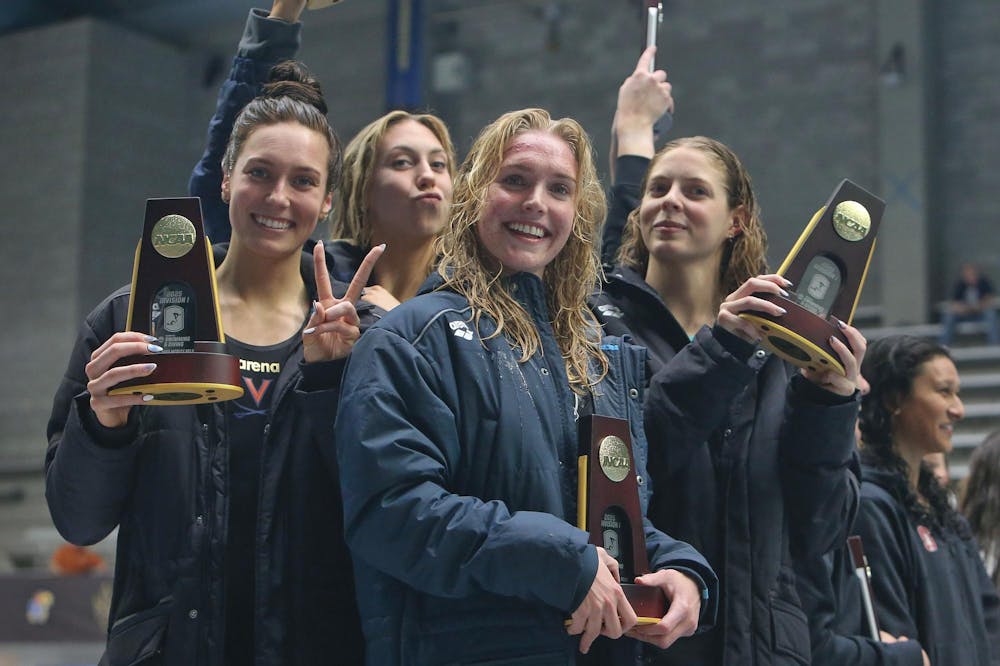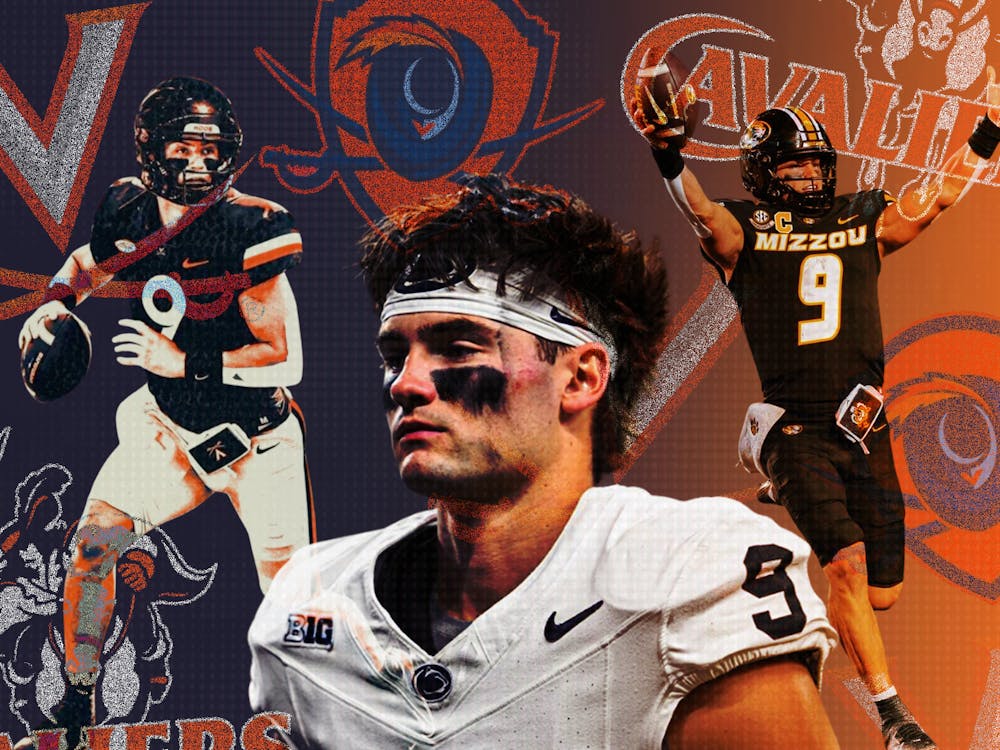What happens to a dynasty when it loses its monarchs?
Within the brick castle that is the Aquatic & Fitness Center, Coach Todd DeSorbo is grappling with that very question after both Gretchen and Alex Walsh, among others, graduated from the college roster this past year.
After these departures, the team will lean hard into international star power, with senior Aimee Canny, a two-time South African Olympian, already on deck for her final year. The freshman duo of Lana Pudar and Sara Curtis, of Bosnia & Herzegovina and Italy, respectively, have also arrived as further Olympic-level additions.
Meanwhile, the men are surging upward with the arrival of No. 1 and No. 2 freshmen Maximus Williamson and Thomas Heilman — two generational prospects expected to flip the men’s program into a dark-horse for national championship contention.
“On the men’s side … the freshmen are arguably the best class in NCAA history,” DeSorbo said in an interview with The Cavalier Daily. “And then on the women’s side, it’s a new identity, it’s different, because it’s the first time in six years we haven’t had a [Kate] Douglass or a Walsh.”
This creates a rare contrast within the same program — the women attempting to uphold their hard-earned standard with a deeper and more global roster while the men try to leap up through the rankings on the backs of teenage phenoms.
As a result, DeSorbo may be about to face the most complex balancing act of his career — the defense of one dynasty while nurturing the rise of another.
The women — pressure to defend
Even without the Walsh sisters, the Cavalier women are anything but depleted — in fact, a team that once seemed to lean on a handful of stars now looks like a true top-to-bottom powerhouse, with experienced Olympians, NCAA Champions and international podium regulars filling the lanes across every possible stroke and distance.
This increased roster depth is a promising room-read for the five-time NCAA champions, who are undoubtedly eyeing up a history-making sixth. Only three other swimming and diving programs have ever achieved the coveted five-peat, and none have rings on a second hand. So this year, more is on the line than ever before for the most decorated team on Grounds.
“After five in a row, the seniors don’t want to be the class that loses it, and the freshmen don’t want to be the first class to not win it,” DeSorbo said.
Part of continuing their record run will be filling gaps in relays — huge shoes to fill, given that Gretchen Walsh is widely considered the fastest woman in the world right now and Alex Walsh ended her collegiate career as the most decorated ACC athlete of all time.
Luckily, the Cavaliers have no shortage of choice in who to field in this sans-Walsh era. Junior and U.S. Olympian Claire Curzan seems poised to step into multiple key roles — her versatility across butterfly, back and free gives DeSorbo an abundance of flexibility. She is the lone returner from last year’s 200 medley relay and, along with sophomore relay veteran Anna Moesch, one of only two familiar faces across the other relays, excluding only the 800 free relay.
“You want to be graduating people like [G. Walsh and A. Walsh], because it means you've been really successful,” DeSorbo said. “When we graduated Kate [Douglass] a few years ago, people thought, ‘Oh, this is the end. You know, there's a kink in the armor, right?’ And then we just continued [winning].”
A part of that winning is returning the majority of last year’s NCAA roster.
One of those returners is senior captain Emma Weber, an Olympic gold medalist for Team USA, who has been at Virginia for three-straight national championships. After years of winning, Weber noted that the goal is still the same.
“I think [newcomers] get this privilege of pressure,” Weber said. “And I know [DeSorbo] talks about pressure as a privilege, and I think this season, if anything, there is a little bit more of that pressure from the swimming world and the NCAA to defend this title and make six.”
The men — pressure to ascend
Virginia’s men have not shared the same dynastic narrative as the women — never has a national championship banner been hung for the Cavalier men, and their last conference championship title was in 2013, the sixth of a consecutive ACC run.
This past spring, the Cavalier men finished eighth at the ACC Championships and 32nd at NCAAs, their lowest in a decade. They struggled to score points due to a slate of injuries and received a costly relay disqualification.
Now, with the arrivals of Williamson and Heilman, the Virginia men are suddenly on the cusp of national relevance once more.
Depth behind the big names helps to solidify Virginia’s freshman class as the top in the country. Thomas Mercer arrives with ACC-scoring range across multiple events, the kind of versatility coaches covet come February and March. Nathan Szobota and Blake Amlicke give Virginia options on both freestyle and medley relays — Amlicke’s 50 back chops even make him a plausible 200 medley leadoff.
That is precisely why this recruiting class matters — it is not just talent but timing. It has been an uphill climb against longtime ACC powerhouses NC State and Louisville, as well as conference newcomers Stanford and California, but now Virginia look like a genuine threat.
“Last year at ACCs, it felt like I was at NCAAs… [and ACCs] is just going to prepare them.” DeSorbo said. “They're going to be able to walk into NCAAs and be like, ‘I've already raced the best.’ It's not like they're going to be deer caught in the headlights at NCAAs.”
This is where the experience of senior Jack Aikins, senior Sebastien Sergile and the sophomore duo of David King and Spencer Nicholas come in. The men’s side are returning all four competitors from NCAAs this past March, so the former two will have high hopes for their final lap with the Cavaliers.
Aikins, especially, is the spine of this group — after back-to-back summers of heartbreak, he broke through at the U.S. trials to make the World Championships team. If he brings his summer form and Heilman and Williamson deliver A-finals in their predicted event lineup, the Cavaliers could contend for individual, relay and team podiums in the spring.
Still, the risk of banking too much on prodigies is real. The question is not whether they have the talent — that much is proven — but whether they can sustain the pressure of being “program-flippers” in their first year on Grounds.
“There’s a lot behind the scenes that you have to take care of,” Nicholas said. “You can work as hard as you can and not see the results you want to because you haven’t been doing every little detail right … that was something that I struggled with last year.”
The men and women?
The standard for both of these programs is dominance, but the routes there could not look more different.
Virginia has not swept both the men and women’s ACC team titles since 2013 — though it has happened multiple times in program history. This sets up real stakes for the preservation of a dynasty and a breakthrough in a conference that just got exponentially tougher. The women are well positioned to chase a historic title, while the men suddenly have the firepower to possibly clinch a first.
“There's nothing that's really out of our reach right now,” Aikins said. “I think everyone coming in, we're all on the same page right now with what we think is achievable. And we're all excited about that possibility.”







